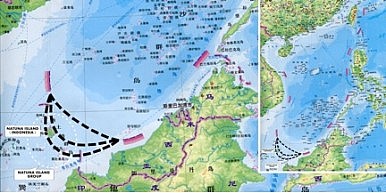Is Beijing targeting Indonesia? According to The Diplomat, the Natuna Islands may be the next claim of China in the South China Sea. But the difference this time is the fact that it belongs to Indonesia.
Beijing recently promulgated a map with certain boundaries that claims parts of the South China Sea, including the Natuna Islands as part of its territory. Unfortunately, Beijing faces negligible resistance to the ongoing annexation of the South China Sea.
Over the last two years, China has reinforced its territorial ambitions via intimidation, coercion, military force, naval patrols, localised blockades, oil rig placements, construction of facilities on numerous small islands and sub-surface shoals, as well as antagonistic and hostile actions directed to ASEAN claimants.

Until recently, Indonesia seemed immune to China’s territorial ambition, with Indonesia’s government offering itself as an honest broker and neutral mediator for conflicts amongst its neighbours – China, Vietnam, the Philippines, Malaysia, Brunei, Taiwan.
But China’s recent inclusion of the Natuna region in newly sanctioned maps and Chinese passports, Indonesia’s newly elected President, Joko Widodo, may have to answer China’s aggression as part of a foreign policy response and in order to protect Indonesia’s territorial integrity.
In March 2014, Indonesia acknowledged — for the first time — that China’s unilateral claims on most of the South China Sea include parts of Indonesia’s Riau province, to which Natuna and other islands belong. Despite Indonesia’s attempts to avoid the South China Sea conflicts, it finds itself the latest victim of China’s territorial ambitions.
The Natuna archipelago has been the subject of Indonesia-China conflicts. Until the 1970’s, most Natuna residents were ethnic Chinese. Deadly anti-Chinese riots plagued Indonesia from the 1960s through to the 1980s. A major eruption occurred in 1998, leading to a decline of the ethnic Chinese population on Natuna.
The decline was more than 80 percent, with many ethnic Chinese in Southeast Asia believing that a rumoured secret meeting was held between Deng Xiaoping and Natuna islanders of Chinese origin. The assumption is they asked that Deng to back their bid for independence from Indonesia, or to incorporate the region as a Chinese territorial possession.Neither happened.
As part of a nationwide transmigration initiative, the Indonesian government started to relocate ethnically Malay Indonesians to Natuna in the 1980s, for the stated reasons of “importing skills and relieving population pressures on the overcrowded main island of Java”. This was perceived by local Indoesian Chinese as a way of diluting Chinese influence locally.
In 1996, Indonesia perceived that China had signalled territorial claims on the seas near Natuna. In response, it conducted a major naval exercise, deploying almost 20 000 personnel to the Natuna Sea.
Jakarta wished to demonstrate resistance to any perceived Chinese attempts at controlling their territories, which were being developed for natural gas production. The private entities involved in this infrastructure project were US energy companies.
At the time, the military efforts of Indonesais appeared to deter China’s ambitions. But after 18 years of military expansion, China is unlikely to be deterred by Indonesian efforts, nor perceive it as a credible deterrent.
In 1996, Indonesian military exercises in the Natuna area motivated a regional specialist at the Indonesian Institute of Sciences, Dewi Fortuna Anwar,to state “China respects strength. If they see you as being weak, they’ll eat you alive.”
The late Deng Xiaoping’s wait-it-out mantra regarding the East and South China Sea disputes was: “This generation is not wise enough to settle such a difficult issue. It would be an idea to count on the wisdom of following generations to settle it.”
This sentiment has been superseded by Xi Jinping, who has effectively dominated the South China Sea by virtue of China’s navy. Apparently, the dictum of Mao Zedong, who said that “Political power grows out of the barrel of a gun”, will hold true for any future developments.
It might be wise for the Singapore government to review its diplomatic positions and foreign policy. China is many thousands of kilometres away. But for the foreseeable future, we’ll continue to be a part of Southeast China. Any perception of Singapore as a Chinese enclave weakens our strategic position in Southeast China, economically and politically.

